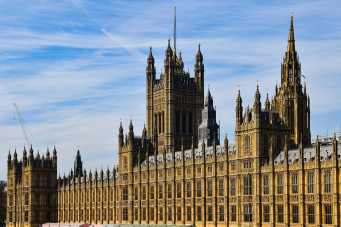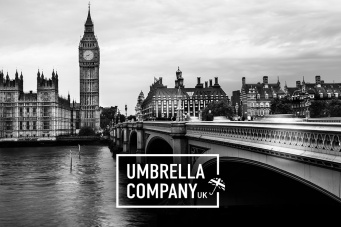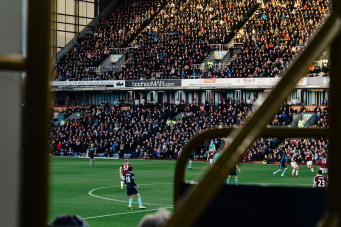
In The Frame – November ’15
Streaming / Online / Tech
EE has added a subscription streaming service to its TV package. TVPlayer, costing £4.99 per month, is operated by Simplestream and offers access to 25 premium channels. Customers are also able to subscribe to additional apps, such as Sky Sports, Sky Movies and kids’ VOD service Hopster, through their set-top box.
Roku have announced the launch of Amazon Video on their streaming platform in the UK. It means Roku customers can now rent or buy more than 50,000 movies and TV episodes, while Amazon Prime members can stream a library of more than 15,000 films and shows.
Roku also gives British users access to other major streaming services, including Netflix, Google Play Movies, Sky Store and NOW TV, as well as terrestrial television catch-up channels such as the BBC iPlayer, ITV Player, All 4 and Demand 5.
Sky, meanwhile, has launched its new Sky Q box – their new entertainment system featuring up to 12 tuners, 12TB of storage and lets viewers record up to four live shows while watching a fifth.
An accompanying Sky Q Mini box lets users wirelessly access Sky Q in other rooms of the home – without needing to be connected to the main dish, and a related app lets users watch live, on-demand and recorded content from a tablet.
Sky Q will be available in the UK and Ireland from early 2016, with an Ultra HD service to follow “quickly afterwards”.
BBC News
The BBC has announced £150million of cuts by 2017 (including the 1,000 job losses announced in July) to make up the deficit caused by a sharp decline in the number of households paying for a TV licence, as viewers increasingly opt for catch-up programming online.
Watching BBC services only via the iPlayer doesn’t currently require payment of the licence fee, which the BBC calls the “iPlayer loophole”. The corporation has had assurances from the government that it will be closed. Licence fee revenue in 2013/2014 was £3.7billion.
A further £550million of savings are due to be announced in spring 2016, after the BBC agreed to take on the cost of providing over-75s with free television licences – approximately £650 million and currently funded by the government.
The 2016 announcement has been timed to coincide with the publication of government proposals for the BBC’s next Royal Charter – the corporation hopes to put pressure on John Whittingdale, the culture secretary, by pre-empting his proposals.
Director-General Tony Hall has stated that the corporation is on track to cut support staff and slim down the number of senior managers but added: “The BBC’s financial position means there is no alternative but to cut services. Cuts to budgets for programmes and services are unavoidable”. A BBC spokesman also commented: “We will inevitably have to either close or reduce some services.”
So which services will be “closed” or “reduced”?
Sport
A BBC statement said: “£35million will be saved from the BBC’s TV sports rights budget. Meeting this savings target will be tough, particularly given the high levels of inflation in the market. We, therefore, anticipate this will lead to the loss of some existing rights and events.”
BBC coverage of Formula 1 motor racing could find itself on the hard shoulder.
Owen Gibson in The Guardian: “…aside from the evergreen and ever-popular Match of the Day, [BBC sports programmes] are, in the main, big ‘event’ broadcasts. Increasingly, the BBC is giving up on televised sport as part of its day-to-day offering.”
But if Discovery decides to show the Olympic Games free to air – and foregoes the sub-licensing income from the BBC – it could be the corporation’s biggest threat to those “big ‘event’ broadcasts”.
TV
There are also to be reductions in factual, comedy and entertainment programming – a further TV budget cut of £12 million.
Online
The same amount is to be found within the BBC’s online offerings. Core news is likely to be the focus, with magazine-style content, such as recipes and features, facing the chop. BBC News itself is to lose £5 million from its budget.
Red button
Finally, a “phased exit” from Red Button services is also now being considered, as internet-connected set-top boxes now allow viewers to access the service online which, combined with a reduction in distribution costs, could save £16 million.
The spring announcement could pave the way for BBC Four to close or be merged with BBC Two, the News Channel moving online (or to be closed), and CBBC and CBeebies to be dropped.
On the bright side…
Lord Hall has stated that the corporation is now one of the most efficient organisations in the public sector, and there was some good news when the chancellor promised, in his recent Spending Review, an £85million boost for the World Service.
ITV News
In September’s edition, we brought you news of ITV’s decision to replace itv.com and the ITV Player with The ITV Hub. Well, it’s now live. “With over 50 hours of new content every week, the ITV Hub is the digital destination for the very latest must-see programmes and our new, swipe to live feature is a brilliant way to bring viewers even closer to the programmes they love,” said ITV’s director of online, Paul Kanareck.
And finally…
- BBC2 is to celebrate the career of Stephen Fry in Stephen Fry: A Life on Screen, which will reflect on Fry’s career spanning more than three decades and will go out this Christmas. David Attenborough’s 90th birthday will also be celebrated with a special show next year.
- The Irish Top Gear producer punched by Jeremy Clarkson earlier this year is suing the presenter and the BBC for racial discrimination. Oisin Tymon’s claim is based on “verbal abuse” that allegedly accompanied a physical attack during which Clarkson struck Tymon. Top Gear, meanwhile, will return to the BBC on Sunday 8 May, its new presenter Chris Evans has said.
- The Deluxe Entertainment Services Group (DESG) is planning to move out of Soho by consolidating its 13 disparate London buildings into two large purpose-designed super-facilities.
- YouTube owner Google says it will help fund up to $1million (£650,000) in legal fees for some content creators who’ve received copyright takedown notices. It’ll step in if it considers they’ve used copyrighted content fairly.
- Ravensbourne has signed a three-year deal that will enables its postproduction students to access Inside The Edit, the remote craft editing course devised by documentary and reality TV editor Paddy Bird.
- Further to the cuts announced by the BBC this month, it was also announced in November that BBC Three is to move online from February.
- ITV’s coverage of the 6 Nations will be led by Mark Pougatch as the commercial broadcaster shows the annual international rugby union competition for the first time in a shared deal with the BBC.
- Ericsson and Cisco have announced a global business and technology partnership. More on that in a forthcoming post on the Frame 25 blog.
From the latest news to the latest positions – click here to see Frame 25’s most recent additions to its list of available TV jobs.

How the Employment Rights Act 2025 Is Reshaping the Freelance Market

Umbrella Company Reforms - An Overview
